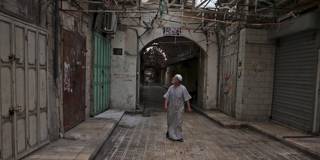European Union financial institutions have poured €1.4 billion into Palestine in an attempt to kick-start economic development. But with the possibility of a negotiated Israeli-Palestinian peace seemingly remote, Europe urgently needs a new aid model that better matches realities on the ground.
BRUSSELS – The European Union’s financial institutions are increasingly focusing on Palestine in order to help spur sustainable development, create jobs, promote growth, and support the post-pandemic recovery. But despite massive flows of investments – mostly in the form of loans to the Palestinian private sector – the EU continues to ignore the structural obstacles to Palestine’s development. Instead, its assistance props up the Palestinian banking system and sustains a broken economy under occupation.
According to a recent EU review of investments in Palestine since 2014, ongoing contributions from “Team Europe” – the EU, its member states, and public development banks, particularly the European Investment Bank and the European Bank for Reconstruction and Development – amount to €1.4 billion ($1.5 billion). Three-fifths of that sum was committed in the past two years, with loans accounting for 71% of the total, or €1 billion.
The EIB, which recently opened an office in Jerusalem for the West Bank and Gaza, is the largest investor, accounting for €372.3 million – over a quarter of all European financing for Palestine. The EU has provided €77.1 million via instruments such as technical assistance, guarantees, and investment grants from the European Fund for Sustainable Development. Other large contributors include Sweden (€279.5 million), France (€253.2 million), and Germany (€166 million). Given that the EU’s core development aid to Palestine in 2020 was around €241 million, these sums are significant.

BRUSSELS – The European Union’s financial institutions are increasingly focusing on Palestine in order to help spur sustainable development, create jobs, promote growth, and support the post-pandemic recovery. But despite massive flows of investments – mostly in the form of loans to the Palestinian private sector – the EU continues to ignore the structural obstacles to Palestine’s development. Instead, its assistance props up the Palestinian banking system and sustains a broken economy under occupation.
According to a recent EU review of investments in Palestine since 2014, ongoing contributions from “Team Europe” – the EU, its member states, and public development banks, particularly the European Investment Bank and the European Bank for Reconstruction and Development – amount to €1.4 billion ($1.5 billion). Three-fifths of that sum was committed in the past two years, with loans accounting for 71% of the total, or €1 billion.
The EIB, which recently opened an office in Jerusalem for the West Bank and Gaza, is the largest investor, accounting for €372.3 million – over a quarter of all European financing for Palestine. The EU has provided €77.1 million via instruments such as technical assistance, guarantees, and investment grants from the European Fund for Sustainable Development. Other large contributors include Sweden (€279.5 million), France (€253.2 million), and Germany (€166 million). Given that the EU’s core development aid to Palestine in 2020 was around €241 million, these sums are significant.